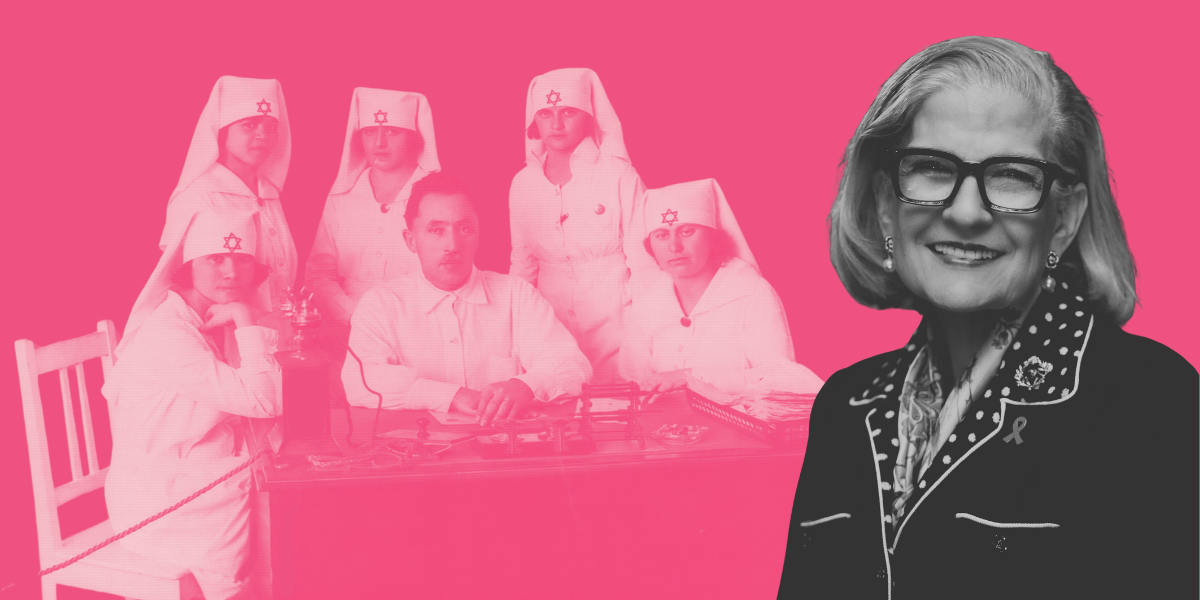Hadassah
President's Column
Watersheds and Existential Threats

As the top spokesperson for the Israel Defense Forces, Rear Admiral Daniel Hagari makes frequent appearances on Israeli and international media outlets. But when he visited Hadassah Hospital Ein Kerem recently, it wasn’t to comment on military operations but to express gratitude for the dedication of the Hadassah Medical Organization staff in treating war casualties. Dr. Yoram Weiss, HMO’s director-general, welcomed Hagari and offered an overview of Hadassah hospitals’ services, including the most recent medical and technological advances.
Dr. Weiss also explained how our history and a certain amount of luck work to our advantage. With two major infrastructure projects nearing completion when the current hostilities began in October 2023, we were able to accelerate the opening of our Gandel Rehabilitation Center at Hadassah Hospital Mount Scopus and the first floors of our renovated Round Building at Ein Kerem to meet the demands of war.
Hadassah’s story is one of working through watersheds and existential threats. Our founding generation may not have felt prepared for the journey they began in 1912, but they thrived on the challenge. Most were raising children, and few had ever worked outside the home. But they launched what grew into a network of hospitals, clinics, dispensaries and infant-welfare stations that became the framework of Israel’s health care system.
The world in which Hadassah embarked on its nation-building program was marked by the Depression, two world wars, the Holocaust and the birth of the Jewish state. Every war Israel has fought since 1948 has been a clash with enemies aiming to destroy the country—the very definition of “existential.” Under that shadow, our institutions and our reputation for excellence in medical care, research and education have nevertheless grown steadily.
Our contribution to the Zionist enterprise has come from planning, building, organizing and advocating. Hadassah is an integral part of Israel’s landscape, its vocabulary and its popular culture.
Hand in hand with building our institutions in Israel, generations of Hadassah women built themselves, studying and training for activism and leadership. One lesson we have learned is that crises often bring opportunities. Since the October 7 Hamas attacks, we have seen a surge in engagement and membership, prompting the birth of new Hadassah chapters. Faced with the threat to Israel and rising antisemitism in America and around the world, more women need what we have to offer.
As in Henrietta Szold’s day, adversity creates a demand for solidarity, sisterhood and promoting our values. Our newest members are attracted not only by our defense of Israel, our humanitarian projects and our efforts to advance a positive image of Zionism, but also by our advocacy on behalf of women’s health, reproductive rights and leadership training.
We are endlessly adapting to challenges. The difficulty of traveling to Israel amid frequent flight cancellations has impacted programs for our Evolve EIE participants. But it coincides with underutilized space at our New York City headquarters because of staff working more days remotely since the Covid pandemic. As a result, we are bringing participants from across America to Hadassah’s national office for a group experience and a virtual Israel trip.
For much of the past 113 years, Hadassah has planned for the future without the luxury of considering what “normal” times are like. We inaugurated our Ein Kerem campus in the tumultuous 1960s, and its iconic Round Building—the original flagship—is now up to 2025 standards. We constantly ask ourselves what we need to add to campuses that will be serving Israel’s population into the 2090s, by which time, no doubt, there will be more towers and renovations.
Between now and then, we pray there will be no more wars, and that one day, generals and admirals will visit only to welcome children or grandchildren into the world. But whatever happens, Hadassah will be ready.









 Facebook
Facebook Instagram
Instagram Twitter
Twitter
Leave a Reply